丘吉尔著名演讲:Never Give Up (英语原文)
- 格式:docx
- 大小:17.33 KB
- 文档页数:5
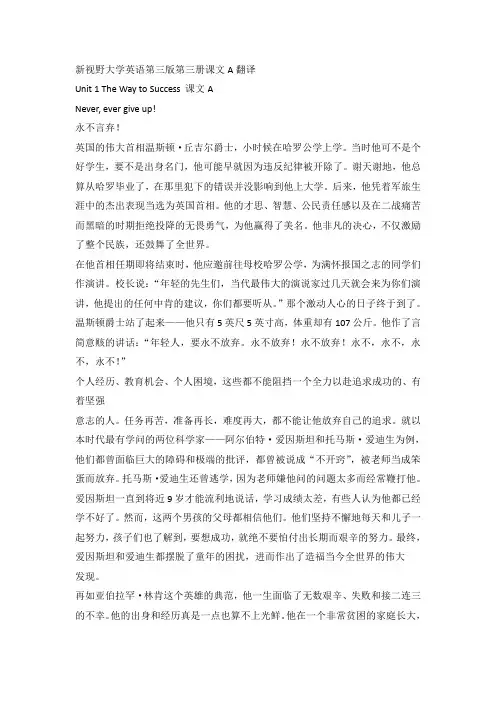
新视野大学英语第三版第三册课文A翻译Unit 1 The Way to Success 课文ANever, ever give up!永不言弃!英国的伟大首相温斯顿·丘吉尔爵士,小时候在哈罗公学上学。
当时他可不是个好学生,要不是出身名门,他可能早就因为违反纪律被开除了。
谢天谢地,他总算从哈罗毕业了,在那里犯下的错误并没影响到他上大学。
后来,他凭着军旅生涯中的杰出表现当选为英国首相。
他的才思、智慧、公民责任感以及在二战痛苦而黑暗的时期拒绝投降的无畏勇气,为他赢得了美名。
他非凡的决心,不仅激励了整个民族,还鼓舞了全世界。
在他首相任期即将结束时,他应邀前往母校哈罗公学,为满怀报国之志的同学们作演讲。
校长说:“年轻的先生们,当代最伟大的演说家过几天就会来为你们演讲,他提出的任何中肯的建议,你们都要听从。
”那个激动人心的日子终于到了。
温斯顿爵士站了起来——他只有 5 英尺 5 英寸高,体重却有 107 公斤。
他作了言简意赅的讲话:“年轻人,要永不放弃。
永不放弃!永不放弃!永不,永不,永不,永不!”个人经历、教育机会、个人困境,这些都不能阻挡一个全力以赴追求成功的、有着坚强意志的人。
任务再苦,准备再长,难度再大,都不能让他放弃自己的追求。
就以本时代最有学问的两位科学家——阿尔伯特·爱因斯坦和托马斯·爱迪生为例,他们都曾面临巨大的障碍和极端的批评,都曾被说成“不开窍”,被老师当成笨蛋而放弃。
托马斯·爱迪生还曾逃学,因为老师嫌他问的问题太多而经常鞭打他。
爱因斯坦一直到将近 9 岁才能流利地说话,学习成绩太差,有些人认为他都已经学不好了。
然而,这两个男孩的父母都相信他们。
他们坚持不懈地每天和儿子一起努力,孩子们也了解到,要想成功,就绝不要怕付出长期而艰辛的努力。
最终,爱因斯坦和爱迪生都摆脱了童年的困扰,进而作出了造福当今全世界的伟大发现。
再如亚伯拉罕·林肯这个英雄的典范,他一生面临了无数艰辛、失败和接二连三的不幸。
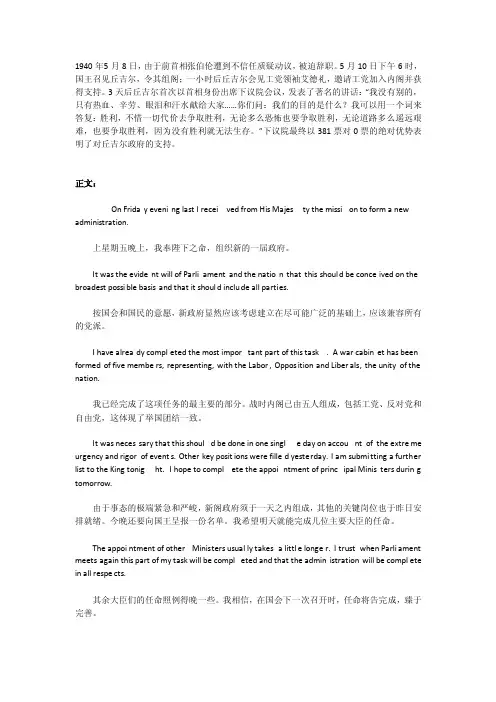
1940年5月8日,由于前首相张伯伦遭到不信任质疑动议,被迫辞职。
5月10日下午6时,国王召见丘吉尔,令其组阁;一小时后丘吉尔会见工党领袖艾德礼,邀请工党加入内阁并获得支持。
3天后丘吉尔首次以首相身份出席下议院会议,发表了著名的讲话:“我没有别的,只有热血、辛劳、眼泪和汗水献给大家……你们问:我们的目的是什么?我可以用一个词来答复:胜利,不惜一切代价去争取胜利,无论多么恐怖也要争取胜利,无论道路多么遥远艰难,也要争取胜利,因为没有胜利就无法生存。
”下议院最终以381票对0票的绝对优势表明了对丘吉尔政府的支持。
正文:On Friday evenin g last I receiv ed from His Majest y the missio n to form a new admini strat ion.上星期五晚上,我奉陛下之命,组织新的一届政府。
It was the eviden t will of Parlia mentand the nation that this should be concei ved on the broade st possib le basisand that it should includ e all partie s.按国会和国民的意愿,新政府显然应该考虑建立在尽可能广泛的基础上,应该兼容所有的党派。
I have alread y comple ted the most import ant part of this task. A war cabine t has been formed of five member s, repres entin g, with the Labor, Opposi tionand Libera ls, the unityof the nation.我已经完成了这项任务的最主要的部分。
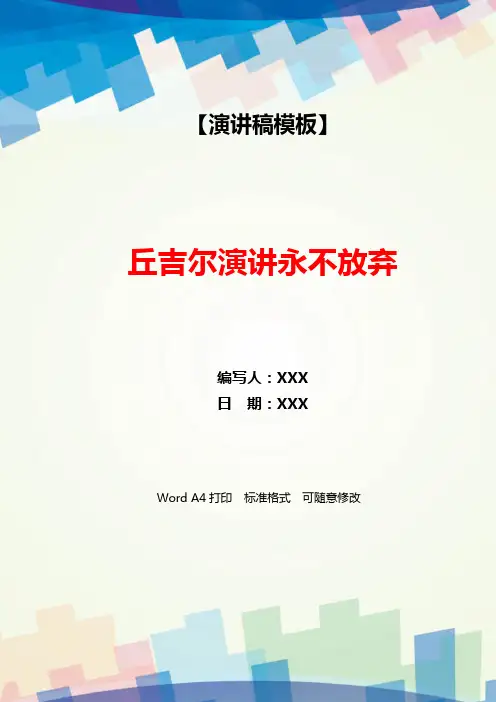
【演讲稿模板】丘吉尔演讲永不放弃编写人:XXX日期:XXXWord A4打印标准格式可随意修改丘吉尔演讲永不放弃篇一:丘吉尔英语演讲稿:就职演说(中英对照)1940年5月8日,由于前首相张伯伦遭到不信任质疑动议,被迫辞职。
5月10日下午6时,国王召见丘吉尔,令其组阁;一小时后丘吉尔会见工党领袖艾德礼,邀请工党加入内阁并获得支持。
3天后丘吉尔首次以首相身份出席下议院会议,发表了著名的讲话:“我没有别的,只有热血、辛劳、眼泪和汗水献给大家……你们问:我们的目的是什么?我可以用一个词来答复:胜利,不惜一切代价去争取胜利,无论多么恐怖也要争取胜利,无论道路多么遥远艰难,也要争取胜利,因为没有胜利就无法生存。
”下议院最终以381票对0票的绝对优势表明了对丘吉尔政府的支持。
正文:On Friday evening last I received from His Majesty the mission to form a new administration.上星期五晚上,我奉陛下之命,组织新的一届政府。
It was the evident will of Parliament and the nation that this should be conceived on the broadest possible basis and that it should include all parties.按国会和国民的意愿,新政府显然应该考虑建立在尽可能广泛的基础上,应该兼容所有的党派。
I have already completed the most important part of this task. A war cabinet has been formed of five members, representing, with the Labor, Opposition and Liberals, the unity of the nation.我已经完成了这项任务的最主要的部分。
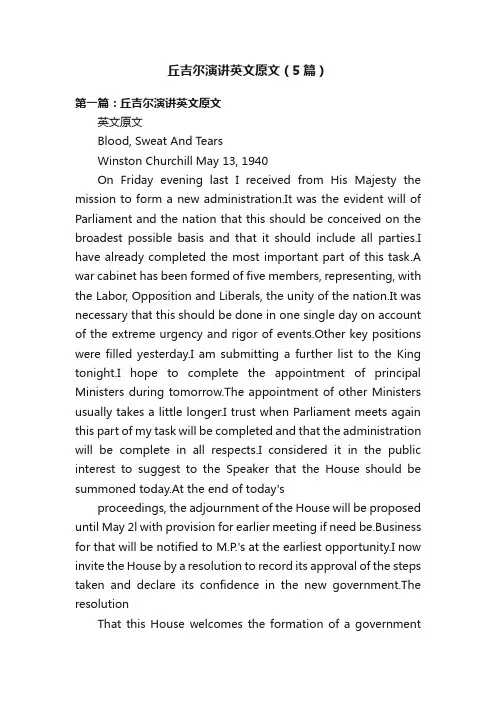
丘吉尔演讲英文原文(5篇)第一篇:丘吉尔演讲英文原文英文原文Blood, Sweat And TearsWinston Churchill May 13, 1940On Friday evening last I received from His Majesty the mission to form a new administration.It was the evident will of Parliament and the nation that this should be conceived on the broadest possible basis and that it should include all parties.I have already completed the most important part of this task.A war cabinet has been formed of five members, representing, with the Labor, Opposition and Liberals, the unity of the nation.It was necessary that this should be done in one single day on account of the extreme urgency and rigor of events.Other key positions were filled yesterday.I am submitting a further list to the King tonight.I hope to complete the appointment of principal Ministers during tomorrow.The appointment of other Ministers usually takes a little longer.I trust when Parliament meets again this part of my task will be completed and that the administration will be complete in all respects.I considered it in the public interest to suggest to the Speaker that the House should be summoned today.At the end of today'sproceedings, the adjournment of the House will be proposed until May 2l with provision for earlier meeting if need be.Business for that will be notified to M.P.'s at the earliest opportunity.I now invite the House by a resolution to record its approval of the steps taken and declare its confidence in the new government.The resolutionThat this House welcomes the formation of a governmentrepresenting the united and inflexible resolve of the nation to prosecute the war with Germany to a victorious conclusion.To form an administration of this scale and complexity is a serious undertaking in itself.But we are in the preliminary Phase of one of the greatest battles in history.We are in action at any other points-in Norway and in Holland-and we have to be prepared in the Mediterranean.The air battle is continuing, and many preparations have to be made here at home.In this crisis I think I may be pardoned if I do not address the House at any length today, and I hope that any of my friends andcolleagues or for mer colleagues who are affected by the political reconstruction will make all allowances for any lack of ceremony with which it has been necessary to act.I say to the House as I said to Ministers who have joined thisgovernment, I have nothing to offer but blood, toil, tears and sweat.We have before us an ordeal of the most grievous kind.We have before us many, many months of struggle and suffering.You ask, what is our policy I say it is to wage war by land, sea and air.War with all our might and with all the strength God has given us, and to wage war against a monstrous tyranny never surpassed in the dark and lamentable catalogue of human crime.That is our policy.You ask, what is our aim I can answer in one word, It is victory.Victory at all costs-victory in spite of all terrors-victory, however long and hard the road may be, for without victory there is no survival.Let that be realized.No survival for the British Empire, no survival for all that the British Empire has stood for, no survival for the urge, the impulse of the ages, that mankind shall move forward toward his goal.I take up my task in buoyancy and hope.I feel sure that our cause will not be suffered to fail among men.I feel entitled at this juncture, atthis time, to claim the aid of all and to say, Come then, let us go forward together with our united strength.这是丘吉尔1940年5月13日在下院发表的首相就职演讲,内容大概如下:“我所能奉贤的,只有热血和辛劳,眼泪和汗水。
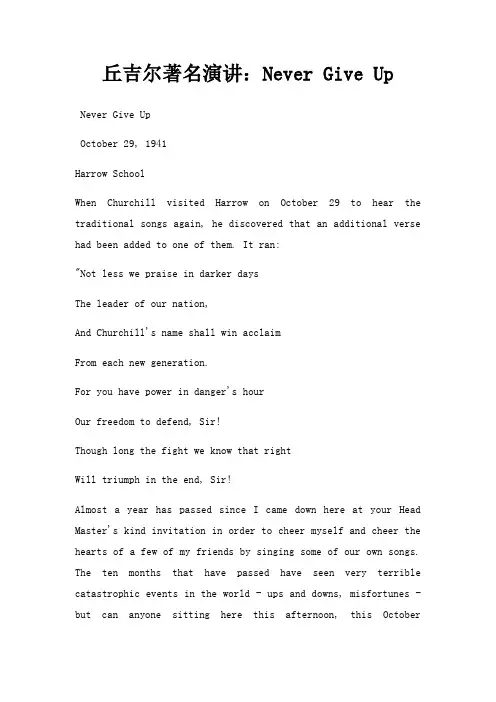
丘吉尔著名演讲:Never Give UpNever Give UpOctober 29, 1941Harrow SchoolWhen Churchill visited Harrow on October 29 to hear the traditional songs again, he discovered that an additional verse had been added to one of them. It ran:"Not less we praise in darker daysThe leader of our nation,And Churchill's name shall win acclaimFrom each new generation.For you have power in danger's hourOur freedom to defend, Sir!Though long the fight we know that rightWill triumph in the end, Sir!Almost a year has passed since I came down here at your Head Master's kind invitation in order to cheer myself and cheer the hearts of a few of my friends by singing some of our own songs. The ten months that have passed have seen very terrible catastrophic events in the world - ups and downs, misfortunes - but can anyone sitting here this afternoon, this Octoberafternoon, not feel deeply thankful for what has happened in the time that has passed and for the very great improvement in the position of our country and of our home? Why, when I was here last time we were quite alone, desperately alone, and we had been so for five or six months. We were poorly armed. We are not so poorly armed today; but then we were very poorly armed. We had the unmeasured menace of the enemy and their air attack still beating upon us, and you yourselves had had experience of this attack; and I expect you are beginning to feel impatient that there has been this long lull with nothing particular turning up!But we must learn to be equally good at what is short and sharp and what is long and tough. It is generally said that the British are often better at the last. They do not expect to move from crisis to crisis; they do not always expect that each day will bring up some noble chance of war; but when they very slowly make up their minds that the thing has to be done and the job put through and finished, then, even if it takes months - if it takes years - they do it.Another lesson I think we may take, just throwing our minds back to our meeting here ten months ago and now, is that appearances are often very deceptive, and as Kipling well says, we must "…meet with Triumph and Disaster. And treat those two impostors just the same."You cannot tell from appearances how things will go. Sometimes imagination makes things out far worse than they are; yetwithout imagination not much can be done. Those people who are imaginative see many more dangers than perhaps exist; certainly many more than will happen; but then they must also pray to be given that extra courage to carry this far-reaching imagination. But for everyone, surely, what we have gone through in this period - I am addressing myself to the School - surely from this period of ten months this is the lesson: never give in, never give in, never, never, never, never-in nothing, great or small, large or petty - never give in except to convictions of honour and good sense. Never yield to force; never yield to the apparently overwhelming might of the enemy. We stood all alone a year ago, and to many countries it seemed that our account was closed, we were finished. All this tradition of ours, our songs, our School history, this part of the history of this country, were gone and finished and liquidated.Very different is the mood today. Britain, other nations thought, had drawn a sponge across her slate. But instead our country stood in the gap. There was no flinching and no thought of giving in; and by what seemed almost a miracle to those outside these Islands, though we ourselves never doubted it, we now find ourselves in a position where I say that we can be sure that we have only to persevere to conquer.You sang here a verse of a School Song: you sang that extra verse written in my honour, which I was very greatly complimented by and which you have repeated today. But there is one word in it I want to alter - I wanted to do so last year,but I did not venture to. It is the line: "Not less we praise in darker days."I have obtained the Head Master's permission to alter darker to sterner. "Not less we praise in sterner days."Do not let us speak of darker days: let us speak rather of sterner days. These are not dark days; these are great days - the greatest days our country has ever lived; and we must all thank God that we have been allowed, each of us according to our stations, to play a part in making these days memorable in the history of our race.英语演讲稿开场白:Never Give Up Never Give Up“If I could reach higher, just for one moment to touch the sky…”---this is from my favorite song Reach.When we are appreciating the passionate melody of Gloria Estefan, we could hardly imagine that she could return to the stage after her paralysis. In the year 1990, this Cuban singer was knocked down in a traffic accident, and the doctor declared that she might never walk again. But Gloria did not give up and kept up constant exercising. Just one year after the disaster, she stood up again and presented this encouraging song at the Atlanta Olympics.Whenever I think of Gloria, I can’t h elp recalling my memory seven years ago, when I first entered university. Naturally shy,ordinary looking, average scores in study, just like an ugly duckling, I seemed to be the least outstanding one in my class. And the successive failures in the beginning led me into despair. “Am I destined to take the back seat to others?” Unwilling to submit to the fate, I paid more efforts on my study as well as many other activities, film dubbing, recital, drama… cause I just want to catch every little opportunity to prove myself. Constant effort yields sure success. Thanks to the competition, I received some awards and most of all, I gained the courage and confidence to face any difficulties in my life journey.Life is just like farming, and what you can reap depends a lot on your sowing and dedication. Once you have a dreaam, don’t be hesitant. Your next difficult step may be the one to the top. Keep going forward, even in the toughest time, and never give up.永不放弃“如果我能到达更高的地方,哪怕只有碰触天空的一刹那…”---选自我所喜爱的歌曲《到达》。
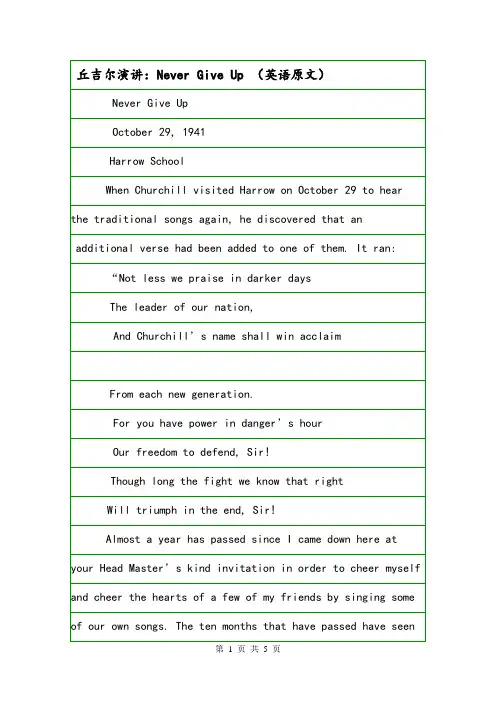
丘吉尔演讲:Never Give Up (英语原文)Never Give UpOctober 29, 1941Harrow SchoolWhen Churchill visited Harrow on October 29 to hear the traditional songs again, he discovered that anadditional verse had been added to one of them. It ran:“Not less we praise in darker daysThe leader of our nation,And Churchill’s name shall win acclaimFrom each new generation.For you have power in danger’s hourOur freedom to defend, Sir!Though long the fight we know that rightWill triumph in the end, Sir!Almost a year has passed since I came down here at your Head Master’s kind invitation in order to cheer myself and cheer the hearts of a few of my friends by singing some of our own songs. The ten months that have passed have seenvery terrible catastrophic events in the world - ups and downs, misfortunes - but can anyone sitting here this afternoon, this October afternoon, not feel deeply thankful for what has happened in the time that has passed and for the very great improvement in the position of our country and of our home? Why, when I was here last time we were quite alone, desperately alone, and we had been so for five or six months. We were poorly armed. We are not so poorly armed today; but then we were very poorly armed. We had the unmeasured menace of the enemy and their air attack still beating upon us, and you yourselves had had experience of this attack; and I expect you are beginning to feel impatient that there has been this long lull with nothing particular turning up!But we must learn to be equally good at what is short and sharp and what is long and tough. It is generally said that the British are often better at the last. They do not expect to move from crisis to crisis; they do not always expect that each day will bring up some noble chance of war; but when they very slowly make up their minds that the thinghas to be done and the job put through and finished, then, even if it takes months - if it takes years - they do it. Another lesson I think we may take, just throwing our minds back to our meeting here ten months ago and now, is that appearances are often very deceptive, and as Kipling well says, we must “…meet with Triumph and Disaster. And treat those two imp ostors just the same.”You cannot tell from appearances how things will go. Sometimes imagination makes things out far worse than they are; yet without imagination not much can be done. Those people who are imaginative see many more dangers than perhaps exist; certainly many more than will happen; but then they must also pray to be given that extra courage to carry this far-reaching imagination. But for everyone, surely, what we have gone through in this period - I am addressing myself to the School - surely from this period of ten months this is the lesson: never give in, never give in, never, never, never, never-in nothing, great or small, large or petty - never give in except to convictions of honour and good sense. Never yield to force; never yield to theapparently overwhelming might of the enemy. We stood all alone a year ago, and to many countries it seemed that our account was closed, we were finished. All this tradition of ours, our songs, our School history, this part of thehistory of this country, were gone and finished and liquidated.Very different is the mood today. Britain, other nations thought, had drawn a sponge across her slate. But instead our country stood in the gap. There was no flinching and no thought of giving in; and by what seemed almost a miracle to those outside these Islands, though we ourselves never doubted it, we now find ourselves in a position where I say that we can be sure that we have only to persevere to conquer.You sang here a verse of a School Song: you sang that extra verse written in my honour, which I was very greatly complimented by and which you have repeated today. But there is one word in it I want to alter - I wanted to do so last year, but I did not venture to. It is the line: “Not less we pr aise in darker days.”I have obtained the Head Master’s permission to alter darker to sterner. “Not less we praise in sterner days.” Do not let us speak of darker days: let us speak rather of sterner days. These are not dark days; these are great days - the greatest days our country has ever lived; and we must all thank God that we have been allowed, each of us according to our stations, to play a part in making these days memorable in the history of our race.。
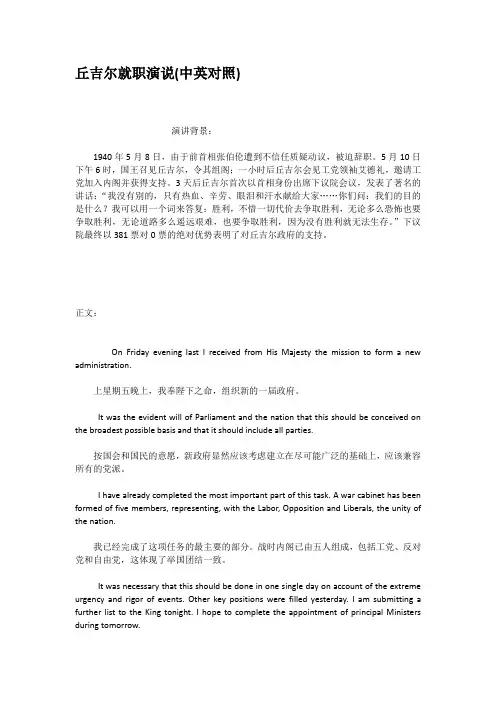
丘吉尔就职演说(中英对照)演讲背景:1940年5月8日,由于前首相张伯伦遭到不信任质疑动议,被迫辞职。
5月10日下午6时,国王召见丘吉尔,令其组阁;一小时后丘吉尔会见工党领袖艾德礼,邀请工党加入内阁并获得支持。
3天后丘吉尔首次以首相身份出席下议院会议,发表了著名的讲话:“我没有别的,只有热血、辛劳、眼泪和汗水献给大家……你们问:我们的目的是什么?我可以用一个词来答复:胜利,不惜一切代价去争取胜利,无论多么恐怖也要争取胜利,无论道路多么遥远艰难,也要争取胜利,因为没有胜利就无法生存。
”下议院最终以381票对0票的绝对优势表明了对丘吉尔政府的支持。
正文:On Friday evening last I received from His Majesty the mission to form a new administration.上星期五晚上,我奉陛下之命,组织新的一届政府。
It was the evident will of Parliament and the nation that this should be conceived on the broadest possible basis and that it should include all parties.按国会和国民的意愿,新政府显然应该考虑建立在尽可能广泛的基础上,应该兼容所有的党派。
I have already completed the most important part of this task. A war cabinet has been formed of five members, representing, with the Labor, Opposition and Liberals, the unity of the nation.我已经完成了这项任务的最主要的部分。
战时内阁已由五人组成,包括工党、反对党和自由党,这体现了举国团结一致。
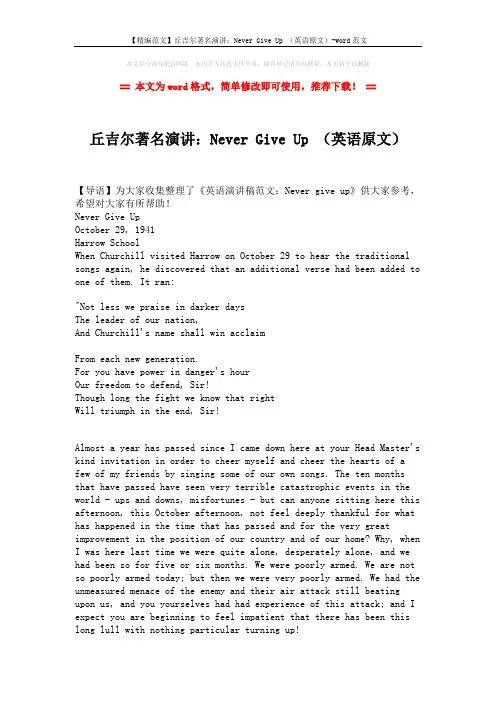
本文部分内容来自网络,本司不为其真实性负责,如有异议请及时联系,本司将予以删除== 本文为word格式,简单修改即可使用,推荐下载! ==丘吉尔著名演讲:Never Give Up (英语原文)【导语】为大家收集整理了《英语演讲稿范文:Never give up》供大家参考,希望对大家有所帮助!Never Give UpOctober 29, 1941Harrow SchoolWhen Churchill visited Harrow on October 29 to hear the traditional songs again, he discovered that an additional verse had been added to one of them. It ran:"Not less we praise in darker daysThe leader of our nation,And Churchill's name shall win acclaimFrom each new generation.For you have power in danger's hourOur freedom to defend, Sir!Though long the fight we know that rightWill triumph in the end, Sir!Almost a year has passed since I came down here at your Head Master's kind invitation in order to cheer myself and cheer the hearts of a few of my friends by singing some of our own songs. The ten months that have passed have seen very terrible catastrophic events in the world - ups and downs, misfortunes - but can anyone sitting here this afternoon, this October afternoon, not feel deeply thankful for what has happened in the time that has passed and for the very great improvement in the position of our country and of our home? Why, when I was here last time we were quite alone, desperately alone, and we had been so for five or six months. We were poorly armed. We are not so poorly armed today; but then we were very poorly armed. We had the unmeasured menace of the enemy and their air attack still beating upon us, and you yourselves had had experience of this attack; and I expect you are beginning to feel impatient that there has been this long lull with nothing particular turning up!But we must learn to be equally good at what is short and sharp and what is long and tough. It is generally said that the British are often better at the last. They do not expect to move from crisis to crisis; they do not always expect that each day will bring up some noble chance of war; but when they very slowly make up their minds that the thing has to be done and the job put through and finished, then, even if it takes months - if it takes years - they do it.Another lesson I think we may take, just throwing our minds back to our meeting here ten months ago and now, is that appearances are often very deceptive, and as Kipling well says, we must "…meet with Triumph and Disaster. And treat those two impostors just the same."You cannot tell from appearances how things will go. Sometimes imagination makes things out far worse than they are; yet without imagination not much can be done. Those people who are imaginative see many more dangers than perhaps exist; certainly many more than will happen; but then they must also pray to be given that extra courage to carry this far-reaching imagination. But for everyone, surely, what we have gone through in this period - I am addressing myself to the School - surely from this period of ten months this is the lesson: never give in, never give in, never, never, never, never-in nothing, great or small, large or petty - never give in except to convictions of honour and good sense. Never yield to force; never yield to the apparently overwhelming might of the enemy. We stood all alone a year ago, and to many countries it seemed that our account was closed, we were finished. All this tradition of ours, our songs, our School history, this part of the history of this country, were gone and finished and liquidated.Very different is the mood today. Britain, other nations thought, had drawn a sponge across her slate. But instead our country stood in the gap. There was no flinching and no thought of giving in; and by what seemed almost a miracle to those outside these Islands, though we ourselves never doubted it, we now find ourselves in a position where I say that we can be sure that we have only to persevere to conquer.You sang here a verse of a School Song: you sang that extra verse written in my honour, which I was very greatly complimented by and which you have repeated today. But there is one word in it I want to alter - I wanted to do so last year, but I did not venture to. It is the line: "Not less we praise in darker days."I have obtained the Head Master's permission to alter darker to sterner. "Not less we praise in sterner days."Do not let us speak of darker days: let us speak rather of sterner days. These are not dark days; these are great days - the greatest days our country has ever lived; and we must all thank God that we have been allowed, each of us according to our stations, to play a part in making these days memorable in the history of our race.以下文字仅用于测试排版效果, 请使用时删除!“山不在高,有仙则灵。

新视野大学英语第三版第三册课文A翻译Unit 1 The Way to Success 课文ANever, ever give up!永不言弃!英国的伟大首相温斯顿·丘吉尔爵士,小时候在哈罗公学上学。
当时他可不是个好学生,要不是出身名门,他可能早就因为违反纪律被开除了。
谢天谢地,他总算从哈罗毕业了,在那里犯下的错误并没影响到他上大学。
后来,他凭着军旅生涯中的杰出表现当选为英国首相。
他的才思、智慧、公民责任感以及在二战痛苦而黑暗的时期拒绝投降的无畏勇气,为他赢得了美名。
他非凡的决心,不仅激励了整个民族,还鼓舞了全世界。
在他首相任期即将结束时,他应邀前往母校哈罗公学,为满怀报国之志的同学们作演讲。
校长说:“年轻的先生们,当代最伟大的演说家过几天就会来为你们演讲,他提出的任何中肯的建议,你们都要听从。
”那个激动人心的日子终于到了。
温斯顿爵士站了起来——他只有 5 英尺 5 英寸高,体重却有 107 公斤。
他作了言简意赅的讲话:“年轻人,要永不放弃。
永不放弃!永不放弃!永不,永不,永不,永不!”个人经历、教育机会、个人困境,这些都不能阻挡一个全力以赴追求成功的、有着坚强意志的人。
任务再苦,准备再长,难度再大,都不能让他放弃自己的追求。
就以本时代最有学问的两位科学家——阿尔伯特·爱因斯坦和托马斯·爱迪生为例,他们都曾面临巨大的障碍和极端的批评,都曾被说成“不开窍”,被老师当成笨蛋而放弃。
托马斯·爱迪生还曾逃学,因为老师嫌他问的问题太多而经常鞭打他。
爱因斯坦一直到将近 9 岁才能流利地说话,学习成绩太差,有些人认为他都已经学不好了。
然而,这两个男孩的父母都相信他们。
他们坚持不懈地每天和儿子一起努力,孩子们也了解到,要想成功,就绝不要怕付出长期而艰辛的努力。
最终,爱因斯坦和爱迪生都摆脱了童年的困扰,进而作出了造福当今全世界的伟大发现。
再如亚伯拉罕·林肯这个英雄的典范,他一生面临了无数艰辛、失败和接二连三的不幸。
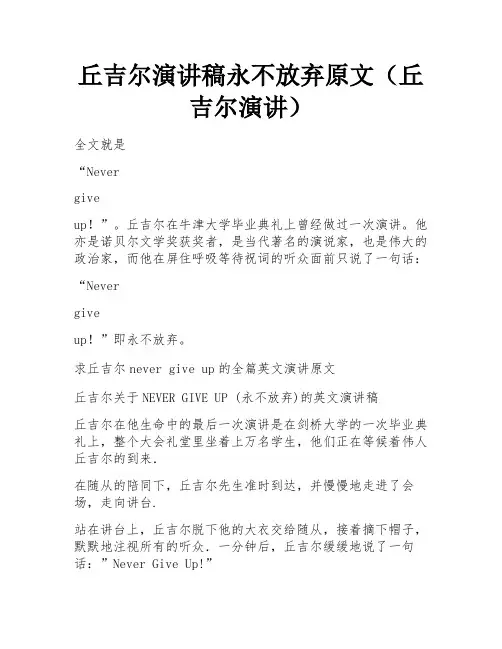
丘吉尔演讲稿永不放弃原文(丘吉尔演讲)全文就是“Nevergiveup!”。
丘吉尔在牛津大学毕业典礼上曾经做过一次演讲。
他亦是诺贝尔文学奖获奖者,是当代著名的演说家,也是伟大的政治家,而他在屏住呼吸等待祝词的听众面前只说了一句话:“Nevergiveup!”即永不放弃。
求丘吉尔never give up的全篇英文演讲原文丘吉尔关于NEVER GIVE UP (永不放弃)的英文演讲稿丘吉尔在他生命中的最后一次演讲是在剑桥大学的一次毕业典礼上,整个大会礼堂里坐着上万名学生,他们正在等候着伟人丘吉尔的到来.在随从的陪同下,丘吉尔先生准时到达,并慢慢地走进了会场,走向讲台.站在讲台上,丘吉尔脱下他的大衣交给随从,接着摘下帽子,默默地注视所有的听众.一分钟后,丘吉尔缓缓地说了一句话:”Never Give Up!”说完这句话后,丘吉尔穿上了大衣带上帽子离开了会场.整个会场鸦雀无声,一分钟后,掌声雷动,经久不息。
丘吉尔演讲稿丘吉尔是二战时期伟大的演说家,他的演说总是振奋人心。
下面是我为大家整理的丘吉尔演讲稿内容,供大家参考阅读。
篇一:丘吉尔演讲稿英国伟大首相丘吉尔先生最精彩的一次演讲,也是最后一次演讲,是在剑桥大学的一次毕业生典礼上。
当时整个会场坐着上万名学生,他们都在期待着伟人丘吉尔的到来。
在随从的陪伴下,令人尊重的丘吉尔先生准时到达会场,走向讲台。
站在讲台上,只见丘吉尔脱下大衣交给随从,然后摘下帽子,默默地注视现场的听众们,过了一分钟,他说了一句话:"Never give up !"(永不放弃)丘吉尔说完戴上帽子、穿上大衣离开了会场。
这让整个会场鸦雀无声,一分钟后,掌声雷动。
永不放弃,永不放弃,永不放弃!丘吉尔一生当中为英国和平立下汉马功劳,这些伟大的成就是丘吉尔坚持不懈努力取得的,是他"永不放弃"精神的最佳写照。
世界上另外一个最经典的关于"永不放弃"的例子,则是世界上最伟大的推销员乔.吉拉德的一场别开生面的演讲。
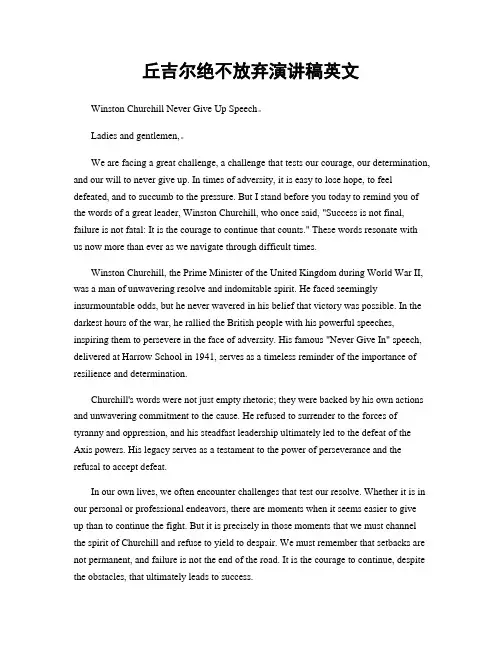
丘吉尔演讲:Never Give Up (英语原文)Never Give UpOctober 29, 1941Harrow SchoolWhen Churchill visited Harrow on October 29 to hear the traditional songs again, he discovered that an additional verse had been added to one of them. It ran:"Not less we praise in darker daysThe leader of our nation,And Churchill's name shall win acclaimFrom each new generation.For you have power in danger's hourOur freedom to defend, Sir!Though long the fight we know that rightWill triumph in the end, Sir!Almost a year has passed since I came down here at your Head Master's kind invitation in order to cheer myself and cheer the hearts of a few of my friends by singing some of our own songs. The ten months that have passed have seen very terrible catastrophic events in the world - ups and downs, misfortunes - but can anyone sitting here this afternoon, this Octoberafternoon, not feel deeply thankful for what has happened in the time that has passed and for the very great improvement in the position of our country and of our home? Why, when I was here last time we were quite alone, desperately alone, and we had been so for five or six months. We were poorly armed. We are not so poorly armed today; but then we were very poorly armed. We had the unmeasured menace of the enemy and their air attack still beating upon us, and you yourselves had had experience of this attack; and I expect you are beginning to feel impatient that there has been this long lull with nothing particular turning up!But we must learn to be equally good at what is short and sharp and what is long and tough. It is generally said that the British are often better at the last. They do not expect to move from crisis to crisis; they do not always expect that each day will bring up some noble chance of war; but when they very slowly make up their minds that the thing has to be done and the job put through and finished, then, even if it takes months - if it takes years - they do it.Another lesson I think we may take, just throwing our minds back to our meeting here ten months ago and now, is that appearances are often very deceptive, and as Kipling well says,we must "…meet with Triumph and Disaster. And treat those two impostors just the same."You cannot tell from appearances how things will go. Sometimes imagination makes things out far worse than they are; yet without imagination not much can be done. Those people who are imaginative see many more dangers than perhaps exist; certainly many more than will happen; but then they must also pray to be given that extra courage to carry this far-reaching imagination. But for everyone, surely, what we have gone through in this period - I am addressing myself to the School - surely from this period of ten months this is the lesson: never give in, never give in, never, never, never, never-in nothing, great or small, large or petty - never give in except to convictions of honour and good sense. Never yield to force; never yield to the apparently overwhelming might of the enemy. We stood all alone a year ago, and to many countries it seemed that our account was closed, we were finished. All this tradition of ours, our songs, our School history, this part of the history of this country, were gone and finished and liquidated.Very different is the mood today. Britain, other nations thought, had drawn a sponge across her slate. But instead our country stood in the gap. There was no flinching and no thought。
丘吉尔著名演讲:Never Give Up (英语原文)Never Give UpOctober 29, 1941Harrow SchoolWhen Churchill visited Harrow on October 29 to hear the traditional songs again, he discovered that an additional verse had been added to one of them. It ran: "Not less we praise in darker daysThe leader of our nation,And Churchill's name shall win acclaimFrom each new generation.For you have power in danger's hourOur freedom to defend, Sir!Though long the fight we know that rightWill triumph in the end, Sir!Almost a year has passed since I came down here at your Head Master's kind invitation in order to cheer myself and cheer the hearts of a few of my friends by singing some of our own songs. The ten months that have passed have seen very terrible catastrophic events inthe world - ups and downs, misfortunes - but can anyone sitting here this afternoon, this October afternoon, not feel deeply thankful for what has happened in the time that has passed and for the very great improvement in the position of our country and of our home? Why, when I was here last time we were quite alone, desperately alone, and we had been so for five or six months. We were poorly armed. We are not so poorly armed today; but then we were very poorly armed. We had the unmeasured menace of the enemy and their air attack still beating upon us, and you yourselves had had experience of this attack; and I expect you are beginning to feel impatient that there has been this long lull with nothing particular turning up!But we must learn to be equally good at what is short and sharp and what is long and tough. It is generally said that the British are often better at the last. They do not expect to move from crisis to crisis; they do not always expect that each day will bring up some noble chance of war; but when they very slowly make up their minds that the thing has to be done and the job put through and finished, then, even if it takes months -if it takes years - they do it.Another lesson I think we may take, just throwing our minds back to our meeting here ten months ago and now, is that appearances are often very deceptive, and as Kipling well says, we must "…meet with Triumph and Disaster. And treat those two impostors just the same."You cannot tell from appearances how things will go. Sometimes imagination makes things out far worse than they are; yet without imagination not much can be done. Those people who are imaginative see many more dangers than perhaps exist; certainly many more than will happen; but then they must also pray to be given that extra courage to carry this far-reaching imagination. But for everyone, surely, what we have gone through in this period - I am addressing myself to the School - surely from this period of ten months this is the lesson: never give in, never give in, never, never, never, never-in nothing, great or small, large or petty - never give in except to convictions of honour and good sense. Never yield to force; never yield to the apparently overwhelming might of the enemy. We stood all alone a year ago, and to many countries itseemed that our account was closed, we were finished. All this tradition of ours, our songs, our School history, this part of the history of this country, were gone and finished and liquidated.Very different is the mood today. Britain, other nations thought, had drawn a sponge across her slate. But instead our country stood in the gap. There was no flinching and no thought of giving in; and by what seemed almost a miracle to those outside these Islands, though we ourselves never doubted it, we now find ourselves in a position where I say that we can be sure that we have only to persevere to conquer.You sang here a verse of a School Song: you sang that extra verse written in my honour, which I was very greatly plimented by and which you have repeated today. But there is one word in it I want to alter - I wanted to do so last year, but I did not venture to. It is the line: "Not less we praise in darker days."I have obtained the Head Master's permission to alter darker to sterner. "Not less we praise in sterner days."Do not let us speak of darker days: let us speakrather of sterner days. These are not dark days; these are great days - the greatest days our country has ever lived; and we must all thank God that we have been allowed, each of us according to our stations, to play a part in making these days memorable in the history of our race.。
丘吉尔的铁幕演说是英国历史学家、政治家、画家、演说家、作家、记者。
以下是小编整理的丘吉尔的铁幕演说,欢迎大家阅读。
丘吉尔铁幕演说原文中英文“美国此刻正高踞于世界权力的顶峰。
对美国民主来说,这是一个庄严的时刻。
拥有最大的力量,也就是对未来负有令人敬畏的责任。
放眼四顾,你不但觉得已经尽了应尽的责任,也感到忧虑,恐怕以后的成就未必能达到这样高的水平。
对你我两国来说,现在都有一个机会在这里,一个明确的、光彩夺目的机会。
如果拒绝、忽视、或糟蹋这个机会,我们将受到后世长期的责备。
……“当美国的军事人员在立场严重的局势时,他们习惯于在他们的指令的头上写上‘全面战略概念’字样。
这种做法是明智的,因为它能使思想明朗化。
那么,什么是我们为今天所应题写的全面战略概念呢?它不应该低于在一切地方的所有男女的所有家庭的安全和幸福以及自由和进步。
……“为了使这些无数的家庭得到安全,必须保护他们,使他们不受两个可怕的掠夺者——战争和暴政——的侵犯。
……“……为了防止战争这一主要目的,已经建立了一个世界组织。
……我们必须使这一切得到肯定:它的工作是有成果的,它是一种现实而不是一种假象,它是一种行动力量而不仅只是语言的空谈,它是一种真正的和平之宫而不仅只是纷纷扰扰争吵的场所……“然而,我有一个明确而实际的行动建议要提出来。
宫廷和地方行政长官没有县吏和皂吏就不能办事。
因此,必须马上着手给联合国配备一支国际武装力量。
在这个问题上,只能一步一步来,但我们必须从现在开始着手做。
我建议,应邀请每一个大国和其它成员国派出一定数量的空军中队,为这个世界性组织服役。
这些中队将由本国训练和筹备,但在各国轮流驻扎。
他们身着本国的军服,佩戴不同的徽章。
不能要求他们对自己的国家作战,但在其它方面将受这世界性组织的指挥。
这个办法可以小规模地实行起来,让它随着我们信心的增长而扩大。
第一次世界大战后我曾希望做到这一步,相信现在会立即办到。
“不过,如果把美国、英国和加拿大现在所共同掌握的制造原子弹的秘密知识和经验托付给这个仍处于婴儿时代的世界性组织,马氏错误的和轻率的。
丘吉尔著名演讲:Never Give Up (英语原文)Never Give UpOctober 29, 1941Harrow SchoolWhen Churchill visited Harrow on October 29 to hear the traditional songs again, he discovered that an additional verse had been added to one of them. It ran:"Not less we praise in darker daysThe leader of our nation,And Churchill's name shall win acclaimFrom each new generation.For you have power in danger's hourOur freedom to defend, Sir!Though long the fight we know that rightWill triumph in the end, Sir!Almost a year has passed since I came down here at your Head Master's kind invitation in order to cheer myself and cheerthe hearts of a few of my friends by singing some of our own songs. The ten months that have passed have seen very terrible catastrophic events in the world - ups and downs, misfortunes - but can anyone sitting here this afternoon, this October afternoon, not feel deeply thankful for what has happened in the time that has passed and for the very great improvement in the position of our country and of our home? Why, when I was here last time we were quite alone, desperately alone, and we had been so for five or six months. We were poorly armed. We are not so poorly armed today; but then we were very poorly armed. We had the unmeasured menace of the enemy and their air attack still beating upon us, and you yourselves had had experience of this attack; and I expect you are beginning to feel impatient that there has been this long lull with nothing particular turning up! But we must learn to be equally good at what is short and sharp and what is long and tough. It is generally said that the British are often better at the last. They do not expect to move from crisis to crisis; they do not always expect that each day will bring up some noble chance of war; but when they very slowly make up their minds that the thing has to be done and the job put through and finished, then,even if it takes months - if it takes years - they do it. Another lesson I think we may take, just throwing our minds back to our meeting here ten months ago and now, is that appearances are often very deceptive, and as Kipling well says, we must "…meet with Triumph and Disaster. And treat those two impostors just the same."You cannot tell from appearances how things will go. Sometimes imagination makes things out far worse than they are; yet without imagination not much can be done. Those people who are imaginative see many more dangers than perhaps exist; certainly many more than will happen; but then they must also pray to be given that extra courage to carry this far-reaching imagination. But for everyone, surely, what we have gone through in this period - I am addressing myself to the School - surely from this period of ten months this is the lesson: never give in, never give in, never, never, never, never-in nothing, great or small, large or petty - never give in except to convictions of honour and good sense. Never yield to force; never yield to the apparently overwhelming might of the enemy. We stood all alone a year ago, and to many countries it seemed that our account was closed, we were finished. All this。
丘吉尔著名演讲:never give up (英语原文)丘吉尔著名演讲:Never Give Up (英语原文)Never Give Up Otober 29,41 Harro Shool When Churhill visited Harroon Otober 29 to hear the traditional songs again, he disovered that an additional verse had been added to one of them. It ran: "Not less e praise in darker das The leader of our nation, And Churhill's name shall in alaim From eah ne generation. For ou have poer in danger's hour Our freedom to defend, Sir! Though long the fight e kno that right Will triumph in the end, Sir! Almost a ear has passed sine I ame don here at our Head Master's kind invitation in order to heer mself and heer the hearts of a fe of m friends b singing some of our on songs. The ten months that have passed have seen ver terrible atastrophi events in the orld - ups and dons, misfortunes - but an anone sitting here this afternoon, this Otober afternoon, not feel deepl thankful for hat has happened in the time that has passed and for the ver great improvement in the position of our ountr and of our home? Wh, hen I as here last time e ere quite alone, desperatel alone, and e had been so for five or six months. We ere poorl armed. We are not so poorl armed toda; but then e ere ver poorl armed. We had the unmeasured menae of the enem and their air attak still beating upon us, and ou ourselves had had experiene of this attak; and I expet ou arebeginning to feel impatient that there has been this long lull ith nothing partiular turning up! But e must learn to be equall good at hatis short and sharp and hat is long and tough. It is generall said that the British are often better at the last. The do not expet to move from risis to risis; the do not alas expet that eah da ill bring up some noble hane of ar; but hen the ver slol make up their minds that the thing has to be done and the job put through and finished, then, even if it takes months - if it takes ears - the do it. Another lesson I think e ma take, just throing our minds bak to our meeting here ten months ago and no, is that appearanes are often ver deeptive, and as Kipling ell sas, e must "…meet ith Triumph and Disaster. And treat those to impostors just the same." You annot tell from appearanes ho things ill go. Sometimes imagination makes things out far orse than the are; et ithout imagination not muh an be done. Those people ho are imaginative see man more dangers than perhaps exist; ertainl man more than ill happen; but then the must also pra to be given that extra ourage to arr this far-reahing imagination. But for everone, surel, hat e have gone through in this period - I am addressing mself to the Shool - surel from this period of ten months this is the lesson: never give in, never give in, never, never, never, never-in nothing, great or small, large or pett - never give in exeptto onvitions of honour and good sense. Never ield to fore; neverield to the apparentl overhelming might of the enem. We stood all alone a ear ago, and to man ountries it seemed that our aount as losed, e ere finished. All this tradition of ours, our songs, our Shool histor, this part of the histor of this ountr, ere gone and finished and liquidated.Ver different is the mood toda. Britain, other nations thought, had dran a sponge aross her slate. But instead our ountr stood in the gap. There as no flinhing and no thought of giving in; and b hat seemed almost a mirale to those outside these Islands, though e ourselves never doubted it, e no find ourselves in a position here I sa that e an be sure that e have onl to persevere to onquer. You sang here a verse of a Shool Song: ou sang that extra verse ritten in m honour, hih I as ver greatl plimented b and hih ou have repeated toda. But there is one ord in it I ant to alter - I anted to do so last ear, but I did not venture to. Itis the line: "Not less e praise in darker das." I have obtained the Head Master's permission to alter darker to sterner. "Not less e praise in sterner das." Do not let us speak of darker das: let us speak rather of sterner das. These are not dark das; these are great das - the greatest das our ountr has ever lived; and e must all thank God that e have been alloed, eah of us aording to our stations, to pla a part in making these das memorablein the histor of our rae. 高中竞选班长演讲稿高一各位同学: 下午好在这个新组建的班集体中,我很荣幸地成为其中一员。
【2018-2019】丘吉尔著名演讲:Never Give Up (英语原文)word版本本文部分内容来自网络,本司不为其真实性负责,如有异议或侵权请及时联系,本司将予以删除!== 本文为word格式,下载后可随意编辑修改! ==丘吉尔著名演讲:Never Give Up (英语原文)【导语】为大家收集整理了《英语演讲稿范文:Never give up》供大家参考,希望对大家有所帮助!Never Give UpOctober 29, 1941Harrow SchoolWhen Churchill visited Harrow on October 29 to hear the traditional songs again, he discovered that an additional verse had been added to one of them. It ran:"Not less we praise in darker daysThe leader of our nation,And Churchill's name shall win acclaimFrom each new generation.For you have power in danger's hourOur freedom to defend, Sir!Though long the fight we know that rightWill triumph in the end, Sir!Almost a year has passed since I came down here at your Head Master's kind invitation in order to cheer myself and cheer the hearts of a few of my friends by singing some of our own songs. The ten months that have passed have seen very terrible catastrophic events in the world - ups and downs, misfortunes - but can anyone sitting here this afternoon, this October afternoon, not feel deeply thankful for what has happened in the time that has passed and for the very great improvement in the position of our country and of our home? Why, when I was here last time we were quite alone, desperately alone, and we had been so for five or six months. We were poorly armed. We are not so poorly armed today; but then we were very poorly armed. We had the unmeasured menace of the enemy and their air attack still beating upon us, and you yourselves had had experience of this attack; and I expect you are beginning to feel impatient that there has been this long lull with nothing particular turning up!。
丘吉尔著名演讲:Never Give Up (英语原文)Never Give UpOctober 29, 1941Harrow SchoolWhen Churchill visited Harrow on October 29 to hear the traditional songs again, he discovered that an additional verse had been added to one of them. It ran: "Not less we praise in darker daysThe leader of our nation,And Churchill's name shall win acclaimFrom each new generation.For you have power in danger's hourOur freedom to defend, Sir!Though long the fight we know that rightWill triumph in the end, Sir!Almost a year has passed since I came down here at your Head Master's kind invitation in order to cheer myself and cheer the hearts of a few of my friends by singing some of our own songs. The ten months that have passed have seen very terrible catastrophic events inthe world - ups and downs, misfortunes - but can anyone sitting here this afternoon, this October afternoon, not feel deeply thankful for what has happened in the time that has passed and for the very great improvement in the position of our country and of our home? Why, when I was here last time we were quite alone, desperately alone, and we had been so for five or six months. We were poorly armed. We are not so poorly armed today; but then we were very poorly armed. We had the unmeasured menace of the enemy and their air attack still beating upon us, and you yourselves had had experience of this attack; and I expect you are beginning to feel impatient that there has been this long lull with nothing particular turning up!But we must learn to be equally good at what is short and sharp and what is long and tough. It is generally said that the British are often better at the last. They do not expect to move from crisis to crisis; they do not always expect that each day will bring up some noble chance of war; but when they very slowly make up their minds that the thing has to be done and the job put through and finished, then, even if it takes months -if it takes years - they do it.Another lesson I think we may take, just throwing our minds back to our meeting here ten months ago and now, is that appearances are often very deceptive, and as Kipling well says, we must "…meet with Triumph and Disaster. And treat those two impostors just the same."You cannot tell from appearances how things will go. Sometimes imagination makes things out far worse than they are; yet without imagination not much can be done. Those people who are imaginative see many more dangers than perhaps exist; certainly many more than will happen; but then they must also pray to be given that extra courage to carry this far-reaching imagination. But for everyone, surely, what we have gone through in this period - I am addressing myself to the School - surely from this period of ten months this is the lesson: never give in, never give in, never, never, never, never-in nothing, great or small, large or petty - never give in except to convictions of honour and good sense. Never yield to force; never yield to the apparently overwhelming might of the enemy. We stood all alone a year ago, and to many countries itseemed that our account was closed, we were finished. All this tradition of ours, our songs, our School history, this part of the history of this country, were gone and finished and liquidated.Very different is the mood today. Britain, other nations thought, had drawn a sponge across her slate. But instead our country stood in the gap. There was no flinching and no thought of giving in; and by what seemed almost a miracle to those outside these Islands, though we ourselves never doubted it, we now find ourselves in a position where I say that we can be sure that we have only to persevere to conquer.You sang here a verse of a School Song: you sang that extra verse written in my honour, which I was very greatly plimented by and which you have repeated today. But there is one word in it I want to alter - I wanted to do so last year, but I did not venture to. It is the line: "Not less we praise in darker days."I have obtained the Head Master's permission to alter darker to sterner. "Not less we praise in sterner days."Do not let us speak of darker days: let us speakrather of sterner days. These are not dark days; these are great days - the greatest days our country has ever lived; and we must all thank God that we have been allowed, each of us according to our stations, to play a part in making these days memorable in the history of our race.。